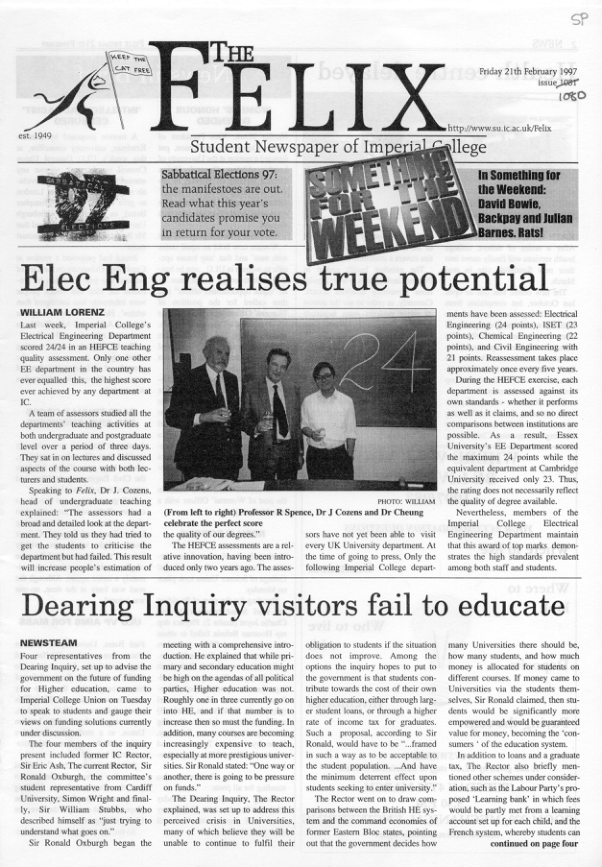Dearing Inquiry visitors fail to educate
Four representatives from the Dearing Inquiry, set up to advise the government on the future of funding for Higher education, came to Imperial College Union on Tuesday to speak to students and gauge their views on funding solutions currently under discussion.
The four members of the inquiry present included former IC Rector, Sir Eric Ash, The current Rector, Sir Ronald Oxburgh, the committee’s student representative from Cardiff University, Simon Wright and finally, Sir William Stubbs, who described himself as "just trying to understand what goes on."
Sir Ronald Oxburgh began the meeting with a comprehensive introduction. He explained that while primary and secondary education might be high on the agendas of all political parties, Higher education was not. Roughly one in three currently go on into HE, and if that number is to increase then so must the funding. In addition, many courses are becoming increasingly expensive to teach, especially at more prestigious universities. Sir Ronald stated: "One way or another, there is going to be pressure on funds."
The Dearing Inquiry, The Rector explained, was set up to address this perceived crisis in Universities, many of which believe they will be unable to continue to fulfil their obligation to students if the situation does not improve. Among the options the inquiry hopes to put to the government is that students contribute towards the cost of their own higher education, either through larger student loans, or through a higher rate of income tax for graduates. Such a proposal, according to Sir Ronald, would have to be "...framed in such a way as to be acceptable to the student population. ...And have the minimum deterrent effect upon students seeking to enter university."
The Rector went on to draw comparisons between the British HE system and the command economies of former Eastern Bloc states, pointing out that the government decides how many Universities there should be, how many students, and how much money is allocated for students on different courses. If money came to Universities via the students themselves, Sir Ronald claimed, then students would be significantly more empowered and would be guaranteed value for money, becoming the ‘consumers ‘ of the education system.
In addition to loans and a graduate tax, The Rector also briefly mentioned other schemes under consideration, such as the Labour Party’s proposed ‘Learning bank’ in which fees would be partly met from a learning account set up for each child, and the French system, whereby students can repay hefty tuition fees through a period of employment with the government.
The meeting was then thrown open to discussion. The small audience of around 25 students, nearly all of whom were Union Officers, were encouraged to voice their opinions. Sir Ronald, acting as impromptu chairman, agreed with one suggestion that there might be too many new courses and Colleges in the UK, admitting "I think that some parts of the current system are very hard to justify."
One audience member asked the representatives of the committee whether they believed that, if students were asked to pay for their education, equality of opportunity could be maintained. Simon Wright pointed out that the current means of funding is already fundamentally unfair. Bright candidates from lower-income families are dissuaded from attending due to financial pressures, while less able students from wealthier families can receive an education subsidised by taxes from poorer parents. Sir Ronald added that scholarships could return to address the balance, enabling students from poorer families to study at prestigious institutions.
After a brief show of hands, it was quickly established that all those students present had been forced to take out a student loan. Medical students in particular suffer from high levels of debt. The Rector conceded that in America the pressing need to pay off large loans had seen a drift towards safe, lucrative subjects such as business and law. However, studies show that students still stand to gain significantly, through higher wages, from their higher education, and so should expect to shoulder some of the burden.
In response, some students claimed that the prospect of a more highly-paid job rarely figured in the decision of sixth-formers to study at university. They also expressed their dissatisfaction with the current loans system, and that they "...didn’t know who would be running it in five years time." Piers Williams, ICU Deputy President for Finance and Services, accused the Inquiry of being ‘pro-debt.’
To the dismay of many in the audience, Sir William did not pose the crucial question; whether students would prefer larger loans or a graduate tax, until the end of the discussion. The general consensus was that a higher rate of income tax for graduates would be less painful for current students, and have fewer detrimental effects upon the number and subject choice of new candidates.
A graduate tax, however, fails to address a number of issues; it does not solve the problem of different institutions needing to charge their students more than others, and, as Sir Eric Ash pointed out, it is not always possible to define who is or is not a graduate.
Perhaps most crucially, a graduate tax cannot begin to raise large amounts of money until today’s graduates constitute a significant fraction of the workforce. This may be several decades away, while the current expansion in HE requires immediate funding. The only solution may be to increase loans in the short term, and introduce ‘top-up loans’ for those students whose parent institutions decide to introduce top-up fees. At the same time, a graduate tax should be slowly phased in, with different subjects and Colleges attracting different rates.
The Dearing Inquiry on HE funding policy is not due to report its findings until after the election





